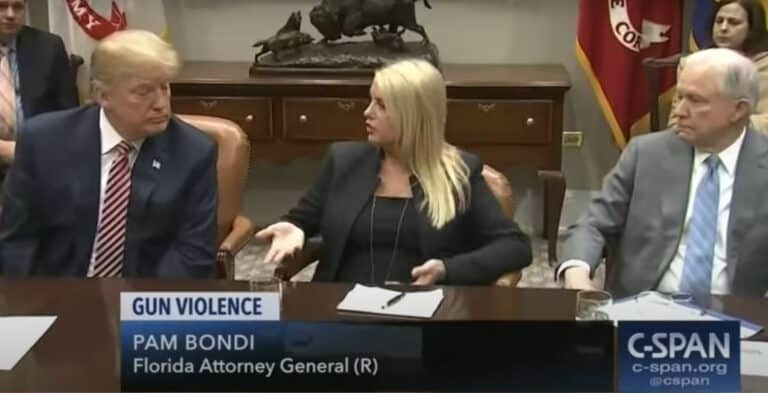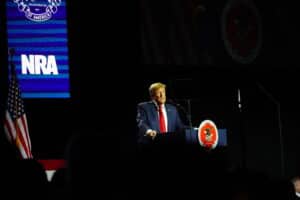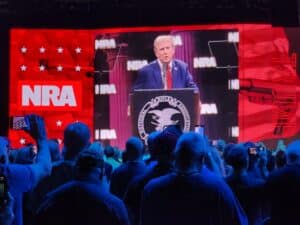Outside of the President himself, few roles in the incoming Trump administration will wield more potential influence on federal gun policy than the Attorney General. His latest pick has a complex history on the issue.
As the chief legal representative of the US Government and head of the Justice Department, the Attorney General (AG) will, among other things, oversee the primary regulatory agency for the firearms industry and direct how and which federal gun laws will be defended in court.
“President Trump will have an attorney general who will stop the weaponization of government against lawful gun ownership and who will prioritize traditional law enforcement by catching and punishing criminals,” his campaign promised the National Rifle Association in an October interview.
After initially tapping embattled former Florida House member Matt Gaetz (R.)—who withdrew from consideration just a few days after being proposed—President-elect Trump named Pam Bondi to replace him. Bondi served two terms as Attorney General of Florida from 2011-2019, where she championed some stricter gun laws but also occasionally fought against others.
Here’s a look at Bondi’s track record on guns and gun policy.
Post-Parkland Tenure
Perhaps most consequentially, Bondi was in office in Florida in the aftermath of the 2018 Parkland school shooting. That incident, where a gunman claimed the lives of 17 and wounded 17 others, captured national attention. It spurred many Republican politicians, including then-President Trump, to consider new gun restrictions.
Trump invited Bondi to the White House a week after the attack as part of a gathering of local and state officials to discuss gun violence and school safety. She was the first to speak and said her office was crafting a “gun violence restraining order” designed to remove firearms from individuals thought to be at risk of harming themselves or others. She called the state’s existing civil commitment law, which could accomplish the same goal, “weak” and said she directed her staff to craft a version of a so-called red flag law.
“I’ve had my solicitor general on it for three days now working on it,” she told the President. “We’ve been rewriting it, and we’re going to bring in something called the gun violence restraining order.”
In an interview with Fox Business several days later, Bondi defended the work of then-Governor Rick Scott (R.) and his administration in putting together what ultimately became a package of new gun-control laws in Florida. Those measures included a bump-stock ban, red flag law, and a measure raising the minimum age to purchase a rifle or shotgun to 21.
“In a time of crisis, it’s about finding common ground, and that’s what Governor Scott’s done,” she said. “That’s why nothing ever gets done in Congress, in my opinion. People are so polarized to one side or the other. We just experienced a traumatic school shooting in Florida, and it’s finding common ground, something both sides can agree on.”
Relationship with Gun-Rights Groups
Bondi had an up-and-down relationship with gun-rights advocates during her time as Florida AG.
The National Rifle Association (NRA) endorsed Bondi and gave her an “A” rating when she initially ran for AG in 2010. In 2013, she signed onto the group’s lawsuit challenging the federal law setting 21 as the minimum age to purchase a handgun from licensed gun dealers.
However, Bondi’s relationship with the NRA and other gun-rights groups deteriorated from there largely because of her role in defending the state’s gun laws. As far back as 2013, the NRA felt compelled to issue an official statement to its members reassuring them that Bondi is “a strong supporter of the Second Amendment” after she fought the appeal of a Florida resident convicted of violating the state’s open carry ban.
“Although Attorney General Bondi is a fearless defender of our Second Amendment rights, she’s also the state’s top lawyer, with a solemn duty to represent the state in criminal appeals,” Marion Hammer, the group’s former President and top Florida lobbyist, wrote in the statement.
Other gun-rights groups, like Florida Carry, were less forgiving.
“We have not seen a Florida Attorney General take such drastic anti-Second Amendment positions since 1987 when Bob Butterworth fought tooth and nail against concealed carry licensing,” Sean Caranna, the group’s executive director, said at the time.
However, in later legal cases, Hammer and the NRA’s relationship with Bondi proved just as contentious.
In a 2018 lawsuit defending the state’s post-Parkland ban on gun sales to adults under the age of 21, Bondi fought against a 19-year-old plaintiff’s request to remain anonymous in the suit. That prompted the NRA to issue a full-throated rebuke.
“The refusal to help protect this young woman is an act of bullying itself,” Hammer said at the time.
Her office defended the law in court against the NRA’s challenge until she left office. Her successor has continued to defend the state’s law before the Eleventh Circuit Court of Appeals.
Other Gun Comments
Bondi hasn’t supported every new gun restriction proposed during her time as a public figure. She opposed a semiautomatic weapon ban in Connecticut after the Sandy Hook shooting and defended Florida’s “stand your ground” law, according to a 2019 Tampa Bay Times article. Although, she also argued that police officers shouldn’t use the stand-your-ground law to defend their shootings.
In 2014, Bondi used her discretion as AG to interpret Florida law as allowing private, armed security officers to work in public schools despite statutory language banning firearms on school property.
“It is my opinion that a school district may exercise its home rule authority to determine whether the use of armed security guards may be ‘in support of an approved school-sanctioned activity,'” Bondi wrote in an official opinion.
After leaving office, Bondi was an early defender of Kyle Rittenhouse after he fatally shot two people and wounded another in a series of violent encounters during an August 2020 riot in Kenosha, Wisconsin.
“People have to understand out there that this was a war zone,” Bondi told Fox News’ Sean Hannity during a September 2020 interview. “You’ve got a 17-year-old trying to protect his state.”
Rittenhouse was ultimately acquitted of any criminal wrongdoing in November 2021 following a high-profile trial that quickly became a cause célèbre for some conservatives and gun-rights supporters.







2 Responses
The Gun Violence Restraining Order (GVRO) seems most pressing at the moment – and it’s simple. If someone ios a threat, don’t take their guns from them – take them out of the public, and hold them in a safe place (involuntarily commit) for their own protection (and the protection of the public) while they can be evaluated and everything sorted.
I don’t want violent / mentally unstable folks to have access to guns – or cars, knives, bats, or gasoline and matches.
Yea, that’s a common critique of “red flag” laws. I haven’t heard Donald Trump or Pam Bondi respond to it yet.